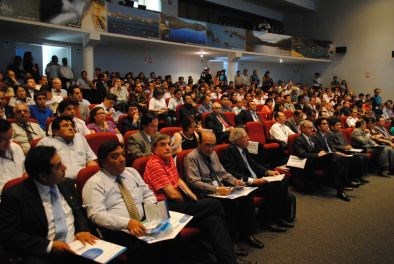The event was part of a process which hopes to culminate in the signing of an agreement among several government ministries to commit Peru to an integrated approach to water resources management (IWRM). Implementing IWRM is seen as a key strategy to achieve water security and develop resilience to climate change.
Sharing Experiences
Throughout the Dialogue, representatives from international cooperation agencies, the private sector, NGOs, universities, and government entities (including the Ministries of Agriculture, Environment, and Energy and Mining) shared successful experiences which showed the close nexus among water, development and climate change. These experiences addressed themes such as sewage water treatment, biofuels, IWRM and effective governance, water financing, natural disaster management and the use of the water footprint concept.
“It pleases me to see the national intellect committed and interested in water resources management, a theme which is taking more and more relevance in the collective mind,” said Hugo Jara, Head of the National Water Authority (ANA). “This motivates us to keep on persevering with our purpose of orienting institutional policy, not only to strengthen our institution but to fulfill the role which the government has assigned to us and which is extremely important for national well-being, to ensure water security with the co-participation of all entities and the entire society.”
Climate Change Effects in Peru
GWP Senior Network Officer for Latin America, Gabriela Grau, said, “When we speak of climate change effects in Peru, it is clear the country faces a complex situation, with few certainties and many uncertainties. One of the certainties is, without question, the contribution of an efficient water management as a strategy for adaptation. Now, more than ever, it is necessary to manage water, integrating all sectors involved in its use, taking into consideration the need to generate resilience to climate change in order to reduce the threat to socio-economic development processes.”
National Water Resources Management Plans
Regarding national water resources management plans, Victor Pochat, keynote speaker and GWP Advisor for Latin America, showed the case of Brazil as an example to follow. Brazil’s plan integrates not only the state water sector (as is the case of Argentina) and the different water users (Peru’s case), but goes further to involve ministries outside the water box, aware that their decisions are key in national development plans, budget allotment, and the relationship with other countries. “Water security is at the heart of adaptation to climate change…a water secure world will need investment in the three “I”: information, institutions and infrastructure,” said Pochat.
“We realize that we need to come together not only across sectors but across disciplines to achieve dialogue and good governance,” said Nicole Bernex, Emeritus Chair of GWP Peru, in a closing statement. “We need integration and leadership, and we need to recognize that if water is a resource for all, it is a responsibility of all as well.”
The event was supported by the Swiss Agency for Development and Cooperation (SDC) and GWP Peru partners: the Pontifical Catholic University of Peru (PUCP) and ANA-Peru.
Photos are available here. The presentation of Victor Pochat can be viewed at http://es.slideshare.net/GWP-Sudamerica/conferencia-magistral-v-pochat

